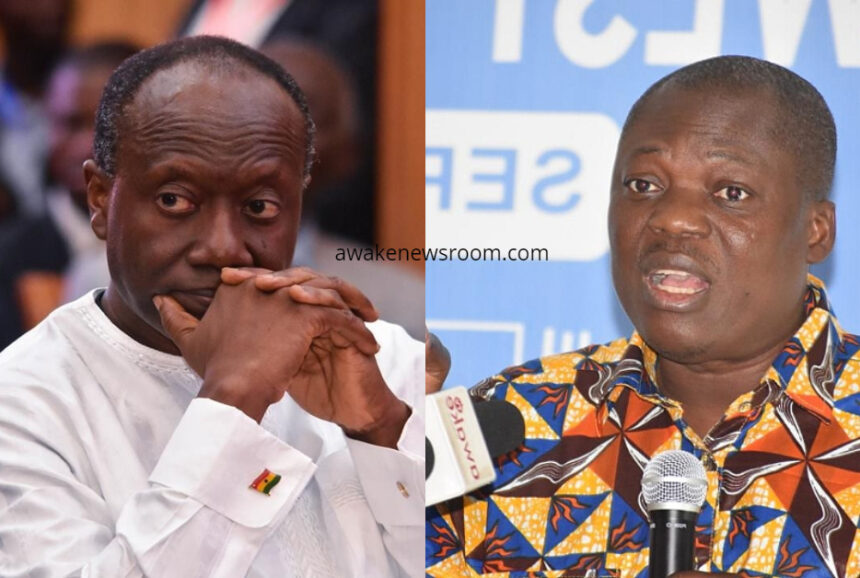The Dean of the University of Cape Coast Business School, Prof. John Gatsi has dismissed claims and impressions created by Finance Minister, Ken Ofori-Attah that President Akufo-Addo led NPP government did not go to the IMF for a bailout programme even in the face of Covid-19.
In an article responding to the Finance Minister’s claims “In paragraphs 24, the Finance Minister stated among others that in the face of Covid-19, Ghana did not go to the IMF for a bailout program”, Prof. Gatsi explained that “A bailout is just a financial support or assistance to reduce difficulty or to avoid the collapse of an economy.” and “In 2020 Ghana actually went to the IMF with approval from parliament to receive one billion United States dollars equivalent to six billion Ghana cedis to reduce the sharp pain and avoid the imminent collapse of the economy.”
The economist, therefore, emphasized that “it is false to say Ghana did not go to the IMF for support.”
“It is also false to create the impression that the NPP does not go to the IMF. From 2001 to 2006 Ghana survived because of the IMF engagement through the HIPC initiative. In 2017 the NPP government relied on the IMF program and extended it. Ghana is also assessing the possibility of accessing another IMF package to deal with debt servicing. So the statement is redundant.” – Prof. Gatsi explains
Prof. Gatsi also said another statement in the Finance Minister’s claims at paragraph 29 is “l have not come here today to ask for more money……, l have not come to ask for more taxes…..”
But the lawyer released otherwise saying the Finance Minister simply has no basis for asking for more money:
“This statement has attracted the attention of Ghanaians. Actually asking for more money or not, asking for more taxes or not depends on compelling reason to do so. If there is no compelling reason, you cannot ask for more. It has multiple meanings depending on the needs of individuals. The statements actually mean that for the taxes and hardships being experienced by Ghanaians, the government cannot do anything about them. So citizens should continue to face the hardships but no new tax-related hardships will be imposed. This is another way of saying the government cannot reduce nor remove the taxes imposed even though they are excruciatingly harsh. It may also mean that many of the programs and projects in the 2020 budget have not been achieved so no need to ask for more money and taxes.”
Read his full article:
Government went to IMF for Covid-19 bailout, Ofori – Atta didn’t ask more because there is no basis
The mid-year review of the national budget is largely about accounting to the people as to what has been done and how and what will be done to implement the budget for the next six months.
In paragraphs 24, the Finance Minister stated among others that in the face of Covid-19, Ghana did not go to the IMF for a bailout program. A bailout is just a financial support or assistance to reduce difficulty or to avoid the collapse of an economy. In 2020 Ghana actually went to the IMF with approval from parliament to receive one billion United States dollars equivalent to six billion Ghana cedis to reduce the sharp pain and avoid the imminent collapse of the economy. It is false to say Ghana did not go to the IMF for support.
It is also false to create the impression that the NPP does not go to the IMF. From 2001 to 2006 Ghana survived because of the IMF engagement through the HIPC initiative. In 2017 the NPP government relied on the IMF program and extended it. Ghana is also assessing the possibility of accessing another IMF package to deal with debt servicing. So the statement is redundant.
IMF has been an important partner to both NDC and NPP government’s fiscal rescue agenda in our current democratic governance since 1992.
Another statement is at paragraph 29 “l have not come here today to ask for more money……, l have not come to ask for more taxes…..”
This statement has attracted the attention of Ghanaians. Actually asking for more money or not, asking for more taxes or not depends on compelling reason to do so. If there is no compelling reason, you cannot ask for more. It has multiple meanings depending on the needs of individuals. The statements actually mean that for the taxes and hardships being experienced by Ghanaians, the government cannot do anything about them. So citizens should continue to face the hardships but no new tax-related hardships will be imposed. This is another way of saying the government cannot reduce nor remove the taxes imposed even though they are excruciatingly harsh. It may also mean that many of the programs and projects in the 2020 budget have not been achieved so no need to ask for more money and taxes.
The most progressive approach to revenue assurance and compliance is about how the tax revenue has been utilized. Compliance levels will increase if an efficient public transport system is introduced. When Public services are delivered efficiently in a non-discriminatory manner. When the tax revenue is used to provide efficient public health systems and a reliable safe and peaceful society where there is fair access to socioeconomic opportunities, compliance levels will increase.
In summary government even without Covid-19 stayed with IMF and extended the program until 2019. Again the government went to the IMF for a one billion United States dollar rapid credit facility to cater for Covid-19. Beneficial use of tax revenue is an investment in increased compliance.
By: Efo Korsi Senyo / awakenewsroom.com









